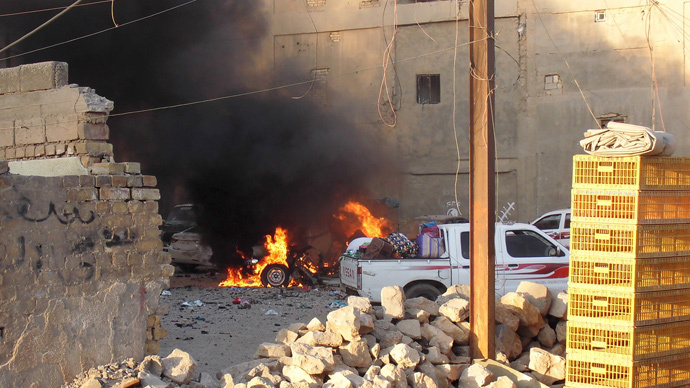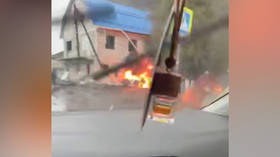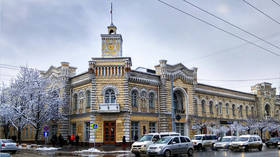‘10-15 years might be needed to retake Ramadi from ISIS’

The anti-IS coalition strategy, based on striking segregated Iraqi areas from the air is wrong, said Danny Makki, of the Syrian youth movement in the UK. The current approach might take up to 15 years to retake the strategically important city of Ramadi.
Shia militias are preparing to fight Islamic State for the city of Ramadi, the capital of Iraq's biggest province. The jihadists have just taken the city, after a month of fierce fighting. The fall of a city as large as Ramadi is seen as a major victory for Islamic State. The radicals' influence in the region is spreading despite constant airstrikes by the US-led coalition. The US keeps saying that it will help the Iraqi government to retake it.
RT:Do you believe that Ramadi can be retaken from the jihadists?
READ MORE: ISIS claims full control of Ramadi after Iraqi troops abandon positions (VIDEO)
Danny Makki: This is very unforeseeable that a city the size of Ramadi will be retaken in a certain amount of time. It is more of a longer-term process because it is such a large city…It was taken by ISIS gradually. This city of Ramadi has been under siege for up to a year now. Supplies have been getting in and out. But ISIS is very strong in terms of asymmetrical warfare and it found a way eventually to get into the city.
Whether the Iraqi forces in their current state could actually retake Ramadi is very hard to see. First of all, the Iraqis lack true fighters on the ground that are capable of taking back areas which is Sunni in the west of Iraq. The majority of the militias who are fighting alongside the Iraqi army are deployed in other areas, such as Tikrit…
So Ramadi is an area nearing Anbar which is of such significant nature to ISIS. They focus a lot of their efforts and strategic planning on taking this particular city in what is a very large defeat for the Iraqi government and for the anti-ISIS coalition led by the US. If the US was truly fighting ISIS as with many other Arab countries and world countries, Ramadi wouldn’t have fallen because it is such a significant city with such an importance on the Iraqi battlefield.

RT:The White House said the US would support Iraq with airstrikes. The bombing campaign has been pretty intense. But as IS's advance has clearly not been halted, is it time for a change of strategy?
DM: The strategy is wrong and it has been wrong since the begging of the anti-ISIS coalition. To fight a group such as IS, which has so much land, territory, weapons and …fighters; you need a gradual structure of making Arab countries with Western assistance fighting them. What the US is doing is just air striking different segregated parts of Iraq. We’ve had over a thousand airstrikes just in the areas of Syria, Kobani, for instance, which took over four months to retake.
Areas such as Ramadi and Anbar would take 10-15 years to retake at the current rate at which the coalition is going. The US is targeting ISIS positions overnight and they continue to target them week in, week out. The problem is that they are running out of targets. ISIS positions are changing so gradually, and ISIS is a group which is a militant non-conventional army. So ISIS knows how to redeploy, it knows how to evade airstrikes, it knows how to deploy to areas where the US really can’t airstrike them.
The problem is - when Iraqi forces are fighting ISIS the US is reluctant to use airstrike which is a fatal strategic area, present in areas of Tikrit. The Iraqi armed forces fought for a long period of time without US efforts, assisting them in any way, shape or form. Ramadi is so significant that it needs the whole of the coalition to work in consensus to retake it. But the US shows no real desire of fighting ISIS, its airstrikes have been a symbolic outburst, and it has left the Iraqis to defend themselves in a situation and a geopolitical conflict which the US helped create at the start.
The statements, views and opinions expressed in this column are solely those of the author and do not necessarily represent those of RT.
The statements, views and opinions expressed in this column are solely those of the author and do not necessarily represent those of RT.












